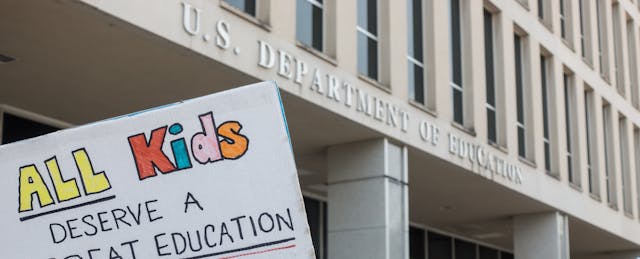When Betsy DeVos first took the helm at the United States Department of Education back in February 2017, pundits, researchers and even EdSurge weighed in on the event—wondering how the new leader would run the show. Yet few could forecast how tumultuous DeVos’ tenure would be, as her policies and responses to legislators and union leaders have garnered the education secretary a growing list of enemies.
The latest news, recently reported in the Wall Street Journal, concerns the White House’s plans to merge the 3,900-employee education department into the 15,000 staff of the U.S. Labor Department. But the proposal doesn’t appear as if it will go over easy with the voting public or Congress. Though the education secretary has yet to weigh in on the reports, it appears to align with her repeatedly stated goal of shrinking the role of federal government in education.
This is not the first time, however, that the White House has put forth an agenda to shrink or abolish the Department of Education. Back in the 1980s under President Ronald Reagan, education secretary Terrel Bell was appointed to essentially work himself out of the job. Reagan, similar to DeVos, was a staunch believer in the concept of states’ rights and in reforms that offered tax credits to parents who wanted to enroll their children in parochial schools.
Like President Trump, Reagan ran on a campaign calling for a smaller federal government, particularly looking to cut funding in the Department of Education. He chose Bell, a fellow conservative and former educator, in the hopes that he would make a compelling case to the Washington establishment for the need to reduce the department’s reach and influence.
But Bell had other plans. In his memoir “The Thirteenth Man,” he describes how he ducked and dodged attempts to reduce and undermine appointments and control of his department. Then, after commissioning a study on the current state of education, Bell rose the Department’s profile with the agenda-setting report, “A Nation At Risk.” The study, with its hyperbolic tone of impending danger, and its famous line stating, “If an unfriendly foreign power had attempted to impose on America the mediocre educational performance that exists today, we might well have viewed it as an act of war,” made education into a national security issue. The report brought schools to the forefront of the public agenda, ultimately raising the prominence and significance of work at the Department.
This plot twist, expanding the role of the Department of Education when many in the White House wanted it downsized, didn’t win Bell many friends in Reagan’s administration, and when he resigned from the position in 1984, reports labeled him an “outsider.”
But there are many observable differences between secretary DeVos and Bell that signal the push to reorganize the department could be different this time. For instance, Bell came from public schools — a former high school teacher and union supporter — so it is not surprising that he would have been ideologically sympathetic to movements in favor of public education. DeVos on the other hand, has had no such experience. Hailing from the business world after attending private schools, she appears ideologically aligned to the mission of the White House.
These ideological differences are what Bell is quoted saying kept him from following through with Reagan’s downsizing agenda. However, with Trump and DeVos seemingly sharing ideals about the direction of the Department of Education, it would be left to the Republican-led Congress to decide if such a reorganization could pass.
UPDATE:
More details on the proposal can be found here.


